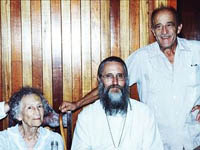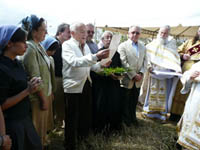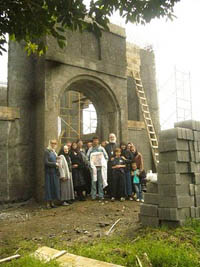Nikolai Ivanovich Zakharov is a descendent of the first wave of immigrants, the oldest Russian diaspora in Costa Rica. He was born in France in 1926. He lived in Paraguay, Argentina and the USA before finally settling in Central America. He is a renowned ornithologist.
Thanks to the efforts of Mr Zacharov, the first hearth of Russian Orthodoxy in Costa Rica was established, the Community of the Protection of the Most-Holy Theotokos, later renamed in honor of the Vladimir Icon of the Mother of God. At the present time, the community, consisting of 60 believers, is building a church in a beautiful neighborhood of San Jose, the capital of Cost Rica.
 |
Nikolai Zakharov and Protopriest Daniel McKenzie and his mother AA Porgin-Zakharova |
 |
The laying of the cornerstone of Vladimir Mother of God Church in 2006
|
 |
Parishioners at the
church construction site |
� Nikolai Ivanovich, please tell us about your parents.
� My father, Ivan Sergeevich, served in the Tsar�s Army and fought in the Civil War. Along with many other patriots, he found himself in Crimea, whence he took a ship to France. My father died when I was two years old.
My mother, Alexandra Alexeevna, was born in 1900 and died in 2000. She was born in Mariupolis, on the Azov Sea, and was the only daughter of a priest, Alexei Mikhailichenko, and his matushka Feoktista. Both her father and grandfather were priests. Fr Alexei died before the Revolution. His brothers were executed by the Bolsheviks.
Mama studied at an institute for noble-born girls, in the agronomy department. Soon after the 1917 Revolution, she and some other students and teachers were arrested. Every night, several people would be taken out of her cell. None of them ever returned. Then came my mother�s turn. She was prepared for the worst, but the prison warden suddenly told her �I ate many times at the table of your father, so I will grant you freedom.� He placed my mother with a Jewish family. They told her �Yesterday you were in power, today it is we who are in power. Keep your mouth shut and do not talk politics.�
In 1923, Mama emigrated to France, where she married Ivan Sergeevich Zakharov. During the NEP [the Soviet Union�s New Economic Policy�ed.], her mother, my grandmother, also came to France, and after many relocations lived out her days in Argentina.
� What happened to you in the emigration? What role did the Church play in the lives of Russians who were forced to leave their Homeland?
� In France, it was difficult for the emigres to survive. Fortunately, my father was able to get a job as a taxi driver. Most Russian doctors, engineers and scholars had to wash bathrooms and floors to earn their daily bread.
In 1935, we arrived in Paraguay. One of the White emigres, General Ivan Timofeevich Belyaev, tried to organize a �Russian center��there, a hostel for refugees from Russia. Wherever Russians of the old guard went, they immediately began to establish an Orthodox church. That happened in Paraguay: in 1928, in Asuncion, the Church of the Protection of the Most-Holy Mother of God was founded.
After living in Asuncion for 7 years, we moved to the city of Encarnacion, not far from the Paraguay-Argentina border, where a church dedicated to St Nicholas the Miracle-Worker was being built. I participated in the construction effort, helping lay bricks. The priest who ministered to our small community was named Fr Andrei.
In 1954, a military coup struck Paraguay. Following the example of many other Russians living in the country, we moved to Argentina, to the Villa Diamante province. The emigres lived on the edge of poverty, since all their property was seized during the putsch. Still, they immediately began to build a church. Fr Nikolai Masich was its rector. Fr Nikolai had had a difficult life. He spent 20 years in Stalin�s camps, lived in Germany, found himself among those who were interred (the so-called DP camps) turned over to the Soviet Union after World War II. Thank God, he was able to make his way to Argentina.
In 1959, Fr Nikolai moved to the US and soon invited our family there. Once again we began life there with a clean slate, first in San Francisco, then some 25 kilometers away, in Burlingame. There, under the guidance of Fr Nikolai, Russian emigres built a beautiful church with a gold cupola. My contribution to this church was recognized in the form of two gramatas [decrees of blessing] from the Ruling Bishop of the Diocese of San Francisco and Western America of the Russian Orthodox Church Outside of Russia, Archbishop Anthony (Medvedev, 1908-2000). I lived in the US from 1959 to 1984.
� What enticed you to resettle in Costa Rica?
� It was for personal motives. Costa Rica is probably to most peaceful nation in Latin America. It has everything anyone could dream of. To be truly happy, Russians in Costa Rica need only an Orthodox Church.
In the mid-1980�s, there were almost none of my compatriots in the country. I proposed that my father and many friends move there. Afterwards, I also brought my mother.
� How was your community formed?
� In 1994, I went to Miami to meet with Protopriest Daniel McKenzie (ROCOR), whom I asked to take on the ministry of the Russian Orthodox flock in Costa Rica. Batiushka agreed and soon flew out to meet us. I covered all expenses. Fr Daniel celebrated Divine Liturgy at my house in the town of San Vito, not far from the Panamanian border (I think it was the first-ever Orthodox service in Costa Rica). From San Vito we headed to San Jose, where Fr Daniel also celebrated Liturgy at a private home. I stood at the entrance and explained to the parishioners how they should cross themselves, how to ask for a blessing.
Fr Daniel is a very good priest, well-respected by our whole community. He is Irish by descent, married to a Russian woman, and is the rector of Miami�s Church of St Vladimir, Equal-to-the-Apostles.
� Why was the Vladimir Icon of the Mother of God chosen as your community�s heavenly protector?
� At first the community was dedicated to the Protection of the Most-Holy Theotokos. Here is� why: The first refugees who fled Russia for France after 1917 were like living skeletons. Many of them suffered from tuberculosis and malnutrition. My older sister Olga died when she was a year old. I was born very weak, and contracted tuberculosis. The doctor told my mother that I would not survive. She then began to pray before the icon of the Protection of the Most-Holy Mother of God that She pray Her Son to save me. Once, when I was already 2 years old, I told my mother that a person with big wings came to me. Mama immediately took me to the doctor. He couldn�t believe that this was the same child whose death he recently predicted. I recovered completely. In memory of my mother�s prayers, I dedicated the community to the Protection of the Mother of God. Later the dedication was changed.
� How big is the community?
� There are 60 members who are active in parish life�Russians who emigrated from the USSR in the last 30 years, Costa Ricans and other nationalities. On Pascha, 100 people attend services. By my estimate, our community has had 85 baptisms.
� Who ministers to the Orthodox Christians of Costa Rica today?
� In 1994, some three or four months after his first visit, Protopriest Daniel McKenzie visited us again. Some Russians help pay for airline tickets for our pastor, thanks to which he visited Costa Rico regularly.
In 2004-2006, Protopriest Georgii Salatanov, a ROCOR clergymen from Russia, served here. Unfortunately, he was not able to get along with the community.
Hiermonk Nicholas (Perekrestov) from New York came a couple of times. He serves at the Cathedral of Our Lady of the Sign, the residence of the Synod of Bishops of the Russian Orthodox Church Outside of Russia, in Manhattan.
Then Fr Daniel returned to minister to our community. With his help, a few parishioners attended the church music courses at Holy Trinity Seminary in Jordanville, NY. Now we boast our own professional choir.
Fr Daniel played an important role in preparing the young priest, Fr Rodion Aragon, to serve. Fr Rodion came to Orthodoxy himself, and was one of the most active parishioners. He left his job in the music industry, and in September 2008 began studies at Holy Trinity Seminary. A few months later, he was ordained to the deaconate, and in January 2009, to the priesthood. In June of that year, he returned to Costa Rica.
Fr Rodion and his matushka, Elena, breathed new life into the parish. They built a chapel attached to their home. Services were held in Russian and Spanish. But the Lord did not deign to allow Fr Rodion to minister to us very long. He fell ill, and suffered a great deal. On January 11, 2010, Fr Rodion died. The pain of that loss will not soon leave us.
� When did you begin building the church? At what stage of construction is it now?
� In April, 2006, our community acquired a parcel of land measuring 2,500 square meters in the northeastern part of San Jose, 10 kilometers from downtown. We plan to build a church there, and a refectory, Sunday school and library.
In January, 2008, Bishop Gabriel (Chemodakov), at the time the Secretary of the Synod of Bishops of the Russian Church Abroad, Protopriest Daniel McKenzie and the Rector of Protection Church of the Moscow Patriarchate in Panama, Protopriest Alexander Gorbunov, blessed the cornerstone of the church. The Synod of Bishops decided to dedicate the church to the Vladimir Icon of the Mother of God. A capsule containing a portion of the relics of Holy Prince Andrei Bogoliubsky was laid into the foundation. His name is closely connected to the Vladimir Icon.
Since then construction significantly picked up pace. The walls are already in place. The erection of a Russian church in Costa Rica was a dream of Fr Rodion, and we must do everything possible to bring this good work to its conclusion.
� What is your opinion of the signing of the Act of Canonical Communion between the Moscow Patriarchate and the Russian Church Abroad?
� I consider the signing of the Act a positive event. The Lord Himself brought together two parts of our Church to reunification.
� What is the significance to the Community of the Mother of God of Vladimir of the �Days of Russia� program in Costa Rica, held in October 2008?
� The �Days of Russia� in Costa Rica had great resonance within the Costa-Rican society. The press covered the celebrations. Especially impressive to the Costa Ricans was the performance of the Sretensky Monastery Men�s Choir in the National Theater in San Jose. The Orthodox faithful attending a moleben with the blessing of the waters by the hierarch who is now His Holiness Patriarch Kirill of Moscow and All Russia before the �Derzhavnaya� Icon of the Mother of God, were provided with great spiritual joy. I made a special trip to the capital to attend this service.
Interviewed by Miguel Palacio